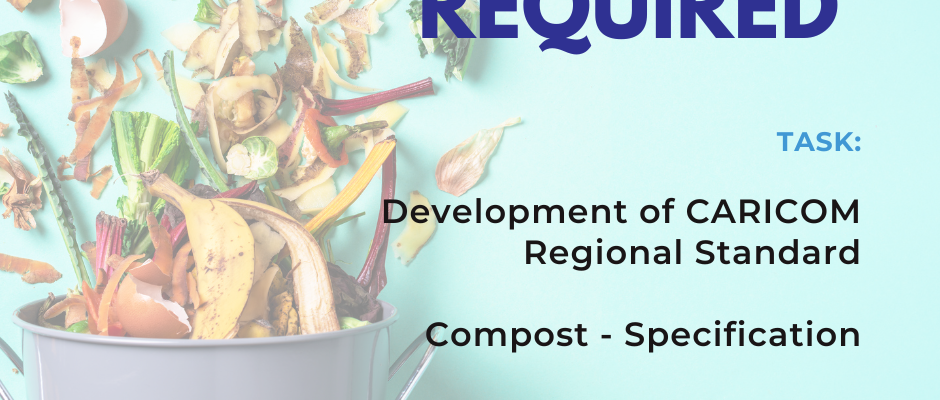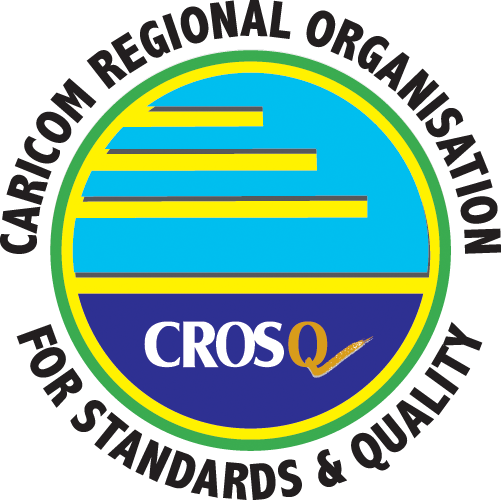
The Inter-American Institute for Cooperation on Agriculture (IICA) and the CARICOM Regional Organisation for Standards and Quality (CROSQ) are inviting applications for the Consultancy Service for the Development of a CARICOM Regional Standard – Compost Specification.
The Terms of Reference for the Consultancy is provided below.
Applications with curriculum vitae should be submitted by 17 March 2023 to iica.jm@iica.int and addressed as follows:
Attention: IICA Jamaica Representative
Inter-American Institute for Cooperation on Agriculture
Delegation in Jamaica
Please note: Only shortlisted candidates will be contacted
The World Bank in 2016 estimated that cities around the world generate 2.01 billion tonnes of solid waste annually, amounting to a per capita distribution of 0.74 kilograms. Latin America and the Caribbean Region (LAC) at 6% (120 million tonnes) is the world’s lowest producer of solid waste. Based on World Bank projections, the world is expected to generate 2.59 billion tonnes of waste annually by 2030. Latin America and the Caribbean generated 231 million tonnes of waste in 2016, averaging 0.99 kilogram per capita per day with 50% of municipal waste classified as food and green waste.
Waste collection coverage for the region is at 84% on average, with collection from rural areas at an estimated 30%. Over 60% of waste is disposed of in some form of landfills, and more than 50% of waste is disposed of in sanitary landfills with environmental controls. Municipal waste generated by the Caribbean was estimated at 9.2million tonnes per annum, averaging 611,118 tonnes/ annum across the fifteen CARICOM countries. A total of 4.7 million tonnes of organic waste is generated per year averaging 317,583 tonnes per country. On average each person across the region generates approximately 1kg of organic waste per day. The region only recycles 4.5% of its waste, while Europe and central Asia recycle 31%. In 2019, the global solid waste market was estimated at US$1 trillion with a 2.30% growth forecasted up to 2026. (Solid Waste Management Market Share, Global Report PDF 2026 (gminsights.com)
As small island developing states (SIDS), a high volume of the solid waste generated by
CARICOM countries is sorted by the poor peddlers who use this as a form of economic
livelihood but much of the organic waste is left in the dumps or landfills. The region like other parts of the world is facing the challenge of incremental degradation of its soils due to climate events (wind and rain), indiscriminate or continuous use of chemical fertilizers in pursuit of increased productivity and complete removal of topsoil by the mining and construction activities. Additionally peasant farming in the region is primarily practiced on slopes and in many instances the good land husbandry practices to reduce water runoff and leaching are not practiced.
The rationale for this standard is to ensure that there are clear and measurable goals,
transparency and harmonization of requirements/specifications, to help enterprises to
benchmark and develop products that are aligned with the needs of the end-user. The purpose is to ensure an environmentally safe product that will not make the environment any worse off than before and increase confidence in the marketability of the product, increases cross border trade, increases revenue/provides an additional source of revenue. The conversion of solid organic waste particularly at the farm level will also reduce the incidence of pests and diseases as a result of increased sanitation and sustaining the bioeconomy by converting waste into value added products.
The primary objective of this consultancy is to provide support to a Regional Project Team (RPT) of voluntary experts in the development of a CARICOM Regional Standard, namely Compost – Specification; as well as the RPT’s Secretariat which will be hosted by the Guyana National Standards Bureau; all working under the supervision and guidance of the CARICOM Regional Organization for Standards and Quality (CROSQ).
To achieve the objective above the consultant is expected to conduct the following activities:
- Attend an inception meeting with the project steering committee.
- Present a methodology and work plan to execute the consultancy.
- Review the background data on heavy metal levels, nutrient/mineral content andespecially deficiencies in soils across the Caribbean
- Recommend baselines for soil mineral content in Caribbean soils
- Recommend parameters for Compost Quality Guidelines from the Baselineestablished in activity #4
- Review established Compost Quality Standards from North America and otherrelevant areas and assess applicability to the Caribbean
- Conduct research as it relates to Compost – Specification such as existinginternational, regional and national standards inclusive of the following publications:
-
- On-farm Composting Handbook
- Farmer's Composting Handbook (fao.org)
- National Engineering Handbook - Part 2 Composting
- Home Composting: The Complete Composter (wi.gov)
- Composting - Simple Steps for Starting at Home (scdhec.gov)
- pdf (ymaws.com)
- Develop Research Report and present to Project Steering Committee (PSC) forcomments and finalise accordingly for acceptance
- Develop a Working Draft (WD) Standard and present to the RPT for its considerationand comments
- Assist the RPT with the development of a consensus driven Committee Draft, by thedisposition of all comments received from the RPT and update the Working DraftStandard accordingly. This updated document will then be registered as a DraftCARICOM Regional Standard (DCRS).
- Work alongside the RPT in the disposition of comments received on the DCRS whencirculated for regional public enquiry and update as necessary, until a Final DraftCARICOM Regional Standard (FDCRS) for regional voting is produced
- Work alongside the RPT Secretariat for the Standard, the Guyana National Bureau ofStandards, as and when necessary, and under the overall supervision of the RPTSecretariat during the entire process of engagement.
The Consultant/s will report to the IICA Jamaica Representative with the frontier support of the CROSQ Secretariat in the relevant areas of competence and is expected to submit/deliver the following:
| Deliverable | Duration |
| Inception Report (items 1& 2 above) | 1.5 days |
| Interim Review Report (items 3-8 above) | 10 days |
| Final Review Report (item 8 above) | 5 days |
| Working Draft (WD and achieve consensus as a Committee Draft) (Items 9 & 10 above) | 15 days |
| Final Draft CARICOM Regional Standard (FDCRS) (items 11-12 above) | 6 days |
The consultancy is expected to encompass 37.5-man days over a period of twelve (12) months.
No travel is currently contemplated in the process, however, if there is, the Project will pay for all travel, per diem and accommodation costs directly.
The consultancy requires the services of a key expert/s. The appointed consultant/s must meet the following minimum requirements individually or collectively:
General Qualifications:
- Advanced degree in Soil Science, Agriculture, and/or Environmental Science orequivalence
Working Experience
- Knowledge of soil amendments and organic fertilizer standards
- Demonstrated ability to identify parameters used in international standard setting forcompost quality and to locate relevant data and regulatory information on Caribbeansoils and agricultural production context
- At least five years’ experience and working knowledge of composting or related subject
- At least five years’ experience with standards development or related field
- Working experience and knowledge of the CARICOM regional standards developmentprocess and procedures
- Demonstrated ability, knowledge and experience in standards drafting
- Ability to communicate and interact with stakeholders, presentation skills an asset
- Proficient skills in written and oral English.
- Proficient skills in editing documents

Offer ended on March 17, 2023


